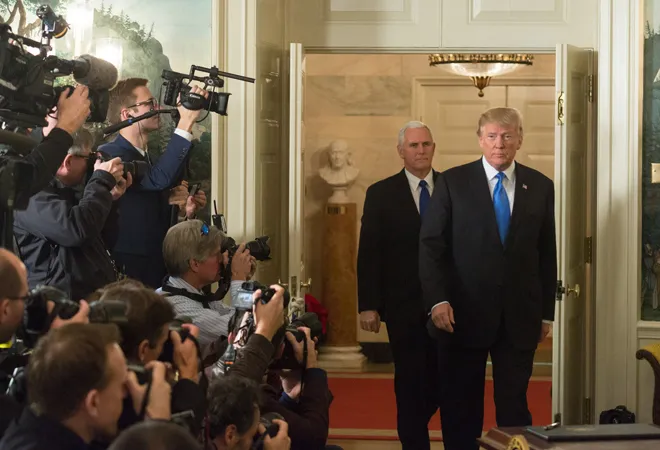-
CENTRES
Progammes & Centres
Location
Whether the American people can withstand the repercussions of a full-fledged trade war with China for long is unclear — but Trump and now Pence are trying to rally public opinion for a sustained fight.

Image Source: D. Myles Cullen/White House
The Trump Administration’s China policy is slowly taking shape, acquiring sharp edges and altering the existing dynamic from “handle-Beijing-with-care” to stare Beijing down.
Vice President Mike Pence’s broadside against China was actually a charge-sheet listing a wide variety of crimes. Unprecedented in scope and rhetorical scale, the speech forced what was thus far inside-the-beltway chatter into the public square.
It marks a fundamental shift that could have worldwide implications, especially in Asia. China overplayed its hand and the United States is finally pushing back. The end game is what some have called “decoupling” of the two economies to make US industries less vulnerable to Chinese theft.
The era of “understanding” Chinese civilisation and accommodating its myriad “manifestations” in today’s Communist Party-controlled China — a line pursued by the Chinese and Henry Kissinger — is formally over.
Pence accused China of trying to influence American public opinion, the upcoming mid-term elections, and even the 2020 presidential elections because Beijing wants “a different American president.” Why? Because unlike past presidents, Donald Trump doesn’t seem to be buying China’s “win-win” model.
The era of “understanding” Chinese civilisation and accommodating its myriad “manifestations” in today’s Communist Party-controlled China — a line pursued by the Chinese and Henry Kissinger — is formally over.
Russian interference in the 2016 US presidential elections pales in comparison to China’s widespread efforts across university campuses, local municipal bodies and think tanks, Pence said. US intelligence has gathered evidence of cyberattacks, industrial warfare and attempts at sowing social discord — all emanating from China.
Using “stolen technology, the Chinese Communist Party is turning ploughshares into swords on a massive scale.” Pence also accused China of trying to push the US from the western Pacific by acquiring capabilities to erode US military advantages on land, at sea, in the air and in space.
The speech at the Hudson Institute, a conservative think tank, brought together various strands of thinking — China’s predatory economic policies, aggressive military posture, societal penetration and its domestic repression — within the Trump Administration into a comprehensive statement.
There will be a military show of strength alongside. The Pentagon has drawn up plans to conduct exercises near China’s territorial waters in November to show the US is prepared to counter Beijing’s military adventurism.
All this is a definite departure from the Obama Administration’s China policy, which in the end was focused mainly on getting Beijing’s cooperation for the climate change agreement.
The Trump Administration’s willingness to confront China on multiple issues remains a vastly underappreciated fact of the new and complex geopolitical scenario. China under Xi Jinping is not used to being challenged at home or abroad but Trump is doing precisely that.
After many years, the US side appears ready to bring question of human rights in China back on the table. Pence excoriated China for the plight of Uighurs, Christians and Tibetans.
The Trump Administration’s willingness to confront China on multiple issues remains a vastly underappreciated fact of the new and complex geopolitical scenario.
How will China react apart from dismissing all charges and claiming innocence? The usual way the Chinese have dealt with US threats in the past is by threatening economic pain while making no concessions and waiting the Americans out. But the current administration may not allow the Chinese to play for time.
Barring the charge of election interference, all other nefarious activities Pence attributed to China were more than evident during the Obama Administration with no real pushback from Washington.
In fact, it could be argued that China consolidated its military presence in South China Sea during the eight years of the previous administration while the US dithered between a “pivot” and a “rebalance.”
But the perception of China in the United States has changed drastically over the last two years largely because of the current administration’s focus on Beijing’s coercive military and trade policies.
Even if erratically, Trump has chosen to confront China by imposing tariffs on $230 billion in Chinese goods. His advisors say that US trade deficit with China — $375 billion last year — is unsustainable and a national security threat.
The perception of China in the United States has changed drastically over the last two years, largely because of the current administration’s focus on Beijing’s coercive military and trade policies.
And the change in perception s both political parties. The Democrats are as concerned as the Republicans about China’s influence operations in the US, especially in light of developments in Australia and New Zealand.
Whether the American people can withstand the repercussions of a full-fledged trade war for long is unclear but Trump and now Pence are trying to rally public opinion for a sustained fight.
China, meanwhile, is using the trade war as a “wedge issue” by taking out paid supplements in US newspapers in precisely the states where American farmers are hurting.
Thus Pence’s additional new charge of election interference against Beijing. “China is targeting US state and local governments and officials to exploit any divisions between federal and local levels on policy,” he said citing the intelligence community.
Beijing has mobilised covert actors, front groups and propaganda outlets to “shift Americans’ perception of Chinese policies.” It is also directly appealing to American voters through propaganda designed to look like news articles, which cast Trump’s trade policies as reckless.
So how would Asian countries react to this US-China reset? Most would welcome a louder American voice even as they play one against the other. Barring Cambodia, North Korea and Pakistan, China has few real friends in Asia. Pakistan may face its moment of truth soon as its economy gets more and more strangled in debt.
The US pushback should help Europeans devise their own strategy to counter China’s divisive drive through the European Union.
It’s very early days yet and Trump’s unpredictability will remain a factor in various calculations around the world.
The views expressed above belong to the author(s). ORF research and analyses now available on Telegram! Click here to access our curated content — blogs, longforms and interviews.

Seema Sirohi is a columnist based in Washington DC. She writes on US foreign policy in relation to South Asia. Seema has worked with several ...
Read More +